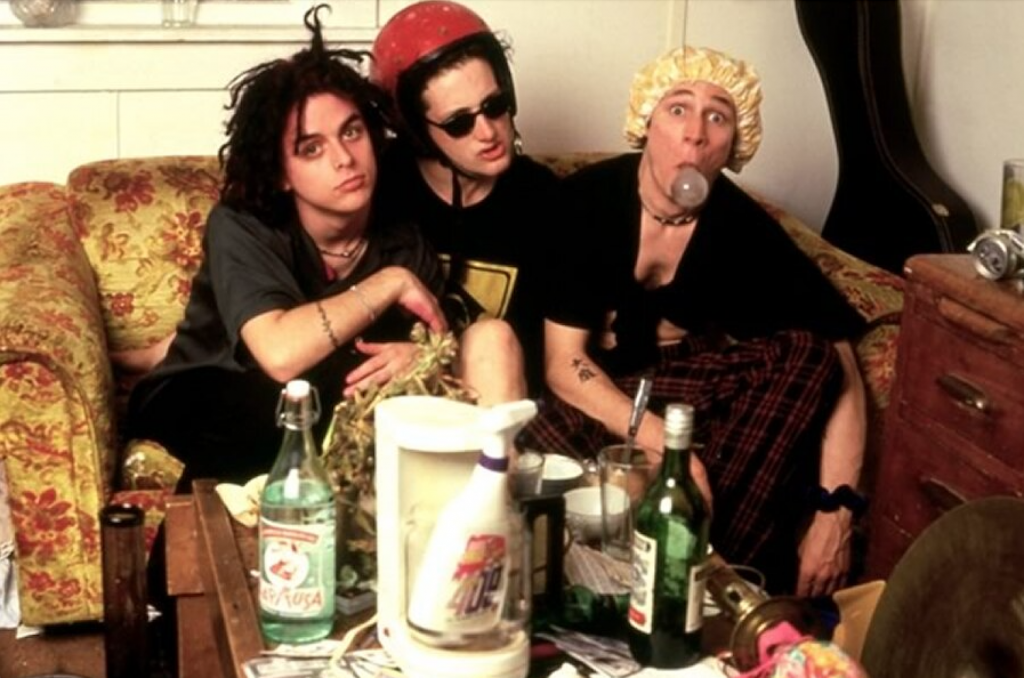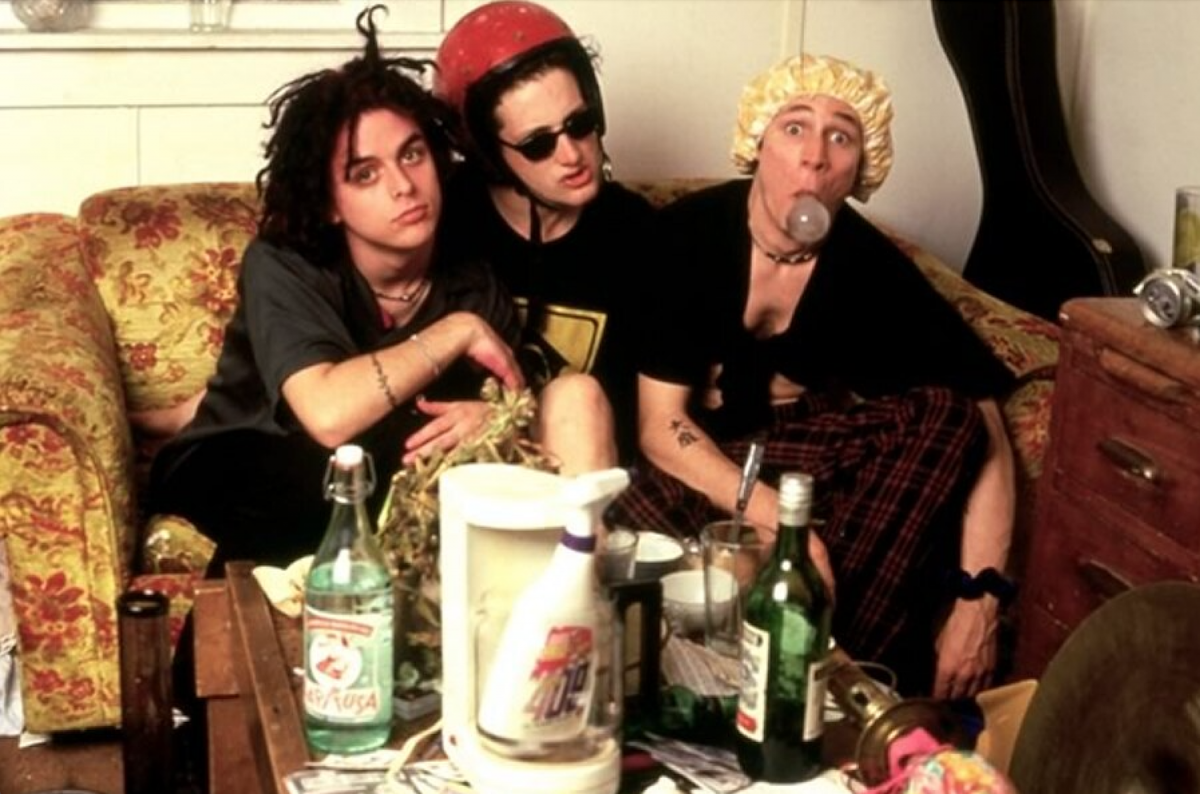
Popcore grows up and out by the San Francisco Bay. By Jamie Kensey
Punk rock wasn’t supposed to be like this. All love and hope, heartstrings and dreams, melody and ache. All shucks and gee whiz. Punk was obnoxious, blaring, political. Fuck you. The Ramones were loud, snotty and rebellious. The Germs were loud, snotty, rebellious and suicidal. Black Flag? Yep, loud and pissed. And San Francisco’s Jawbreaker is … uh, sometimes they’re loud.
Listen up, kids, it’s popcore: churning melodic guitar lines, songs not chronicling our fucked-up world but about our personal demons, friends, family and the inconstancy of daily existence. It has a solid punk core but spreads into all territories of rock, soul and folk without losing its power. Descendants include bands like the Buzzcocks and, well, the Descendents. And the San Francisco Bay Area has almost singlehandedly kept it alive recently, with Jawbreaker and a handful of lesser-known bands continuing the revolution. They still wield a fist, albeit a velvet-gloved one.
“When we started, I had these illusions of being a real art band,” says Jawbreaker songwriter and guitarist Blake Schwarzenbach. “Because of my lack of skill, it ended being punk songs mostly. I really had these ideas of going on noise segments and doing these celestial guitar things.”
The great thing about this revolution is that it’s undefinable. Popcore units aren’t always strictly pop or hardcore. And though they all share a common punk denominator, they scatter in many directions from that starting point, kinda like a pack of huddled roaches when you hit the light switch. Even with the current stigma attached to the “p” word, most of them don’t even mind if you use that as a convenient label for their sound. “They can call us whatever they want, they’re still going to hear us,” says Schwarzenbach.
“Nowadays, there are so many different styles being played in this underground scene,” drummer Adam Pfahler clarifies, “that if a band considers themselves punk, they are basically talking about the way they do business.”
Jawbreaker is a model example of Pfahler’s definition. The band is a classic case of DIY: What you see is what you get, right down to the band’s explanation of why you won’t see Jawbreaker on a major label. “It wouldn’t work,” says bassist Chris Bauermeister. “The way we’ve got it now (with Communion/Tupelo) is too easy.”
“[The majors] treat you like idiots,” adds Schwarzenbach. “They send you this hypothetical contract … But you’d have to sell 100,000 records to make any kind of money.”
“Jawbreaker is now a hit-or-miss thing,” says Bauermeister. “I wouldn’t want to bank on the fact that we’re going to sell six albums over the next seven years. I think that’s unrealistic, and the labels realize that and try to screw you.”
“I don’t begrudge any band that signs,” says Pfahler. “I just worry about them, because I’m afraid of big business, as we all are.”
Jawbreaker’s “least likely to jump ship” status remains intact because of the band’s work as well as its beliefs. The band relishes its status as one of the darker popcore units. Bivouac, the band’s 1992 release, has 13 rough-hewn gems (hooks and introspection intact), all filtered through Schwarzenbach’s gravelly, unkempt voice and a pensive rhythm section that mopes through half the tracks and throws sparks during the rest. And the best part? It shakes your hand instead of punching you in the gut. Schwarzenbach promises the new album, 24 Hour Revenge (recorded by Steve Albini and due out this winter), will be even more direct in its approach.
If Jawbreaker is the popcore holdout, representing the true underground because of its refusal to sign with a major, Green Day (pictured) might be considered the flip side of the coin. Still relatively young, the college-aged trio is a few months into a healthy contract with one of the biggest corporate labels in the world: Warner Bros. With the majors desperate for another Nirvana, it was only a matter of time until they came to the Bay Area knocking on popcore’s door. Green Day has taken the bait and will be the guinea pigs in the experiment to test this genre for mass consumption.
Green Day guitarist/vocalist Billie Joe and bass player Mike (none of the members uses last names) have been bashing away since sixth grade. Drummer Tré was recently recruited when original member John left for college. Early on, Green Day, composed of Berkeley-area natives, found itself at Gilman Street, the now-famous, volunteer-run punk venue that continues to be the only hall in the Bay Area where new punk and art bands can get a start.
Green Day made its name at Gilman. Ironically, the band was originally turned down for not being punk enough. But when younger volunteers took over, the band got its chance and quickly scaled the ranks of the tightly knit Gilman scene, which often ghettoizes its bands. Their major-label deal breaks it from the ranks somewhat, but all band members still hang out there and consider it an integral part of their upbringing, though the trio is reluctant to mention it in the press for fear of overexposure.
“If our record with Warner Bros. goes to a bigger level, I want to try and stay clear of mentioning the place very much,” Billie Joe explains. “Because there is an underground that should be made for only underground purposes. It was our choice to go to a major, but there should be some sort of element to music where the big bucks, the big corporations, should have nothing to do with at all. That’s one thing that really fucked up the whole Seattle scene. As far as Gilman Street and the scene around it. It’s just really genuine. It should be left alone. I don’t want to exploit it.”
The band’s biggest challenge right now is to find an identity on a label that hypes everything from Madonna to My Bloody Valentine. The band insists Warner is not putting its hand in the cookie jar. “It all really depends on how we present ourselves,” says Mike. “I want to keep a low profile, just have them put out our record and kind of mention it and what [music] goes along with it.”
Green Day’s biggest worry is what the signing is going to bring the band in the future. “To tell you the truth,” says Billie, “I’m really fucking scared about the whole thing. We’re probably gonna make a video. I’ve been watching what is going on with MTV … with this ‘Alternative Nation’ thing, and the channel is pathetic. We have no place on it … I would almost rather say I don’t want to be on the fucking thing. I’m really torn. If we could just do it and get over with it, I’d be really happy.”
The Green Day test flight will commence sometime in early ’94 when Warner Bros. releases the as-yet-untitled (but already completed) album. In the meantime, popcore stalwarts J-Church are devising their plans for world domination over in San Francisco’s predominantly Hispanic barrio, the Mission district. The Mission is a world of its own, both a brightly hued cultural panorama and a grim, dark patch of the city filled to the brim with crime-riddled, low-income projects, big-time gang turf wars and serious trash problems. Live there for any period of time, as two-thirds of J-Church does, and you’ll gather more than enough experiences and tales as fodder for your art.
The band’s recent LP, Quetzalcoatl (named for the Aztec god), is littered with Mission references and tells of the love-hate relationship it has with its neighborhood. “Sometimes it’s more hate,” says vocalist/guitarist Lance (J-Church’s members also don’t use last names). “It’s really crazy, but on the other hand, it’s my favorite neighborhood. Everything that I do is here … I just like the mix of people and everything. Plus it’s really cheap to live here. That’s the main thing.”
Quetzalcoatl is probably the most ambitious of the current crop of popcore releases. Lance wraps lines like, “But to you, the last Hüsker Dü must have been something cathartic,” around the muted, almost pathetic rhythms of bassist Gardner and drummer Brendan. Sometimes they pick up speed, but they often give up and collapse under the unwieldy moodiness of Lance’s meanderings. Of course, it all has a hardcore heart, but Lance’s many influences make appearances. “Even punk rock I don’t listen to that much anymore,” he claims. “There are still my favorites, like Rites Of Spring. But most of the stuff I’ve always listened to has been more like the Velvet Underground, Jonathan Richman .. I also like other things like Cheap Trick, Neil Young.”
If Jawbreaker is the anti-corporate hero and Green Day is the big-business experiment, J-Church falls through the cracks somewhere in between, although the band has been approached by the suits all the time. “I think labels are moving in on the Bay Area right now,” says Gardner. “I think they’re hoping it might be the next Seattle.”
“We will consider anything,” says Lance, “but at the same time, we are pretty loyal to John (Yates, a close friend and head of the band’s label, Allied).”
One of J-Church’s conditions would include the new suitor buying out the band’s current contract with Allied. “We are pretty wary, because I know so many bands that have been screwed by major labels,” says Lance. “My main concern, though, is not to screw over John or anyone who have worked their ass off to help us.”
“I don’t want to be a star or anything like that,” says Gardner. “I think that is so ridiculous.”
“If we got to where Green Day is now,” Lance agrees, “that would be fine. We wouldn’t have to go one step further than they did.”
It’s going to be interesting charting the directions in which this scene will wander. Will the suits descend on the Bay Area, gobble it up, water it down and ruin it by attaching some generic label like “the new Seattle”? Or will the scene dig its heels and remain vital and doggedly independent by burrowing further underground? Green Day remains the only big signing; scene grandaddies like the Mr. T Experience are still toughing it out on small indies after nearly a decade. And the current crop has given rise to more young upstarts like Tilt, who, true to the popcore maxim, are searching out new avenues rather than traveling well-worn roads.
You might say there’s a genuine movement in Northern California, and I’m sure more scholarly scribes would try to attach some blustery dissertation. Since I’m not that smart, I’ll just simplify it and say this: It’s about here and now. Punk has always been direct, no nonsense, real. Popcore is just a new branch on its tree, adding life and color. It’s a non-apologetic look at the other side of pissed and proud, the composed and confused. And units like Jawbreaker and J-Church prove its signs are vital and good. Despite Green Day’s signing, current indicators point to an avoidance of the nefarious Seattle hype trap. Make sure you keep your fingers crossed and your hardened punk heart aflutter with those aggressive, sticky-sweet melodies.







One reply on “Punk In Silk Pajamas: Jawbreaker, Green Day And J-Church”
RIP Lance